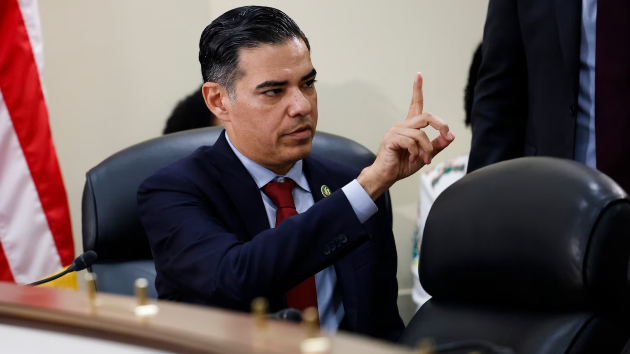Lawmakers renew push to ratify Equal Rights Amendment 100 years later
Written by ABC Audio ALL RIGHTS RESERVED on March 5, 2023

(WASHINGTON) — The Equal Rights Amendment was first drafted and introduced in Congress in 1923 — and now, a century later, a bipartisan group of lawmakers is working to at last enshrine its guarantees of gender equality in the Constitution.
“I’m dismayed that in 2023, we still have to fight to be seen as full citizens given the contributions of women as defenders of our democracy and all the contributions that we make to civic life, to culture, to our economy,” Massachusetts Democratic Rep. Ayanna Pressley, who is leading the effort in the House to ratify the ERA, told ABC News in a segment on “This Week” on Sunday.
Congress passed the ERA in 1972 with support from members of both parties, following efforts by leading female legislators like then-New York Rep. Shirley Chisholm, the first Black woman in Congress.
The amendment states that “equality of rights under the law shall not be denied or abridged by the United States or by any state on account of sex. The Congress shall have the power to enforce, by appropriate legislation, the provisions of this article.”
But after passing the House and Senate, the proposed amendment fell short of the three-fourths majority of states — 38 — needed to ratify it before a seven-year deadline set by Congress. Although lawmakers voted to extend the ratification deadline by an additional three years, no new states signed on amid a campaign by conservative activists led by Phyllis Schlafly to stop the amendment.
Schlafly and others argued at the time that rather than extend legal protections for women, the ERA would force them to be treated like men in other ways — such as pushing them into the military draft. Some also said the amendment would expand abortion access, upend child support requirements or encroach on the sex-separation of bathrooms.
“The majority of women simply don’t want it,” Schlafly argued in 1976.
Complicating matters further, five states later voted to rescind their earlier support for the amendment, though such a move has disputed legal value.
The ERA has seen revived public interest in recent years, following the #MeToo movement, women’s marches and the record number of women running and winning seats in Congress.
Nevada voted to ratify the amendment in 2017, Illinois did so in 2018 and it reached the 38-state threshold needed when Virginia voted to do the same in 2020.
On Tuesday, the U.S. Court of Appeals for the District of Columbia ruled that the congressional deadline on the ERA was legally binding, so the later three ratifications were not valid. Illinois and Nevada sued to demand publication of the measure as the 28th Amendment but failed to show why the deadline that Congress set shouldn’t be enforceable.
Lawmakers and advocates backing the ERA now argue that Congress has the power to lift the deadline because they had the power to impose it in the first place. Pressley told ABC News that it was the “only thing standing in our way.”
“What I think it does is put the ball back in Congress’ court, and that’s where we’ve been playing for quite some time,” said Zakiya Thomas, president and CEO of the ERA Coalition.
Some activists renewed their push to codify the ERA in light of the Supreme Court’s decision last year overruling Roe v. Wade’s national guarantee to abortion access.
“Especially now, it’s important to reintroduce this … in the midst of draconian, very dangerous and targeted attacks against women and the LGBTQ community,” Pressley said. “And really, it’s always time to uplift and to center the humanity and dignity of all people and we need that to be enshrined in the Constitution. I want to vote on this now.”
Last week, the Senate held its first hearing on the ERA in 40 years.
“Here we are, a century after its first introduction, 2023,” said Senate Judiciary Committee Chair Dick Durbin, D-Ill. “It’s time to get the job done. In fact, it’s long overdue.”
The amendment could have real world implications. Jadonna Sanders is a sergeant paramedic with the Washington, D.C., fire department. She has filed a federal lawsuit against the district’s Fire and EMS department alleging gender discrimination and demanding equal pay.
“This is the same story everywhere you go, especially with women who are in a profession such as firefighting, police, you know, where men dominate,” Sanders said.
Officials have pushed back on her claims.
“The department has a long history and a recent history of … hiring women, promoting women,” the department’s chief, John Donnelly, said last year. “Those things seem foreign to me, but we’ll look into them.”
The compensation gap between men and women is just one of several areas that advocates say the ERA would shore up. In 2022, women earned 82 cents on average for every dollar earned by men — a disparity almost unchanged over two decades.
But the battle in Congress is still breaking down along usual party lines.
“The people who are pushing politically to pass this are hanging their head on if it became law, every pro-life measure in this country would fall,” the Senate Judiciary Committee’s ranking Republican member, Lindsey Graham, said during last week’s hearing. Others in the GOP say there is no legislative authority to “revive” the amendment.
Alaska Sen. Lisa Murkowski is one of few Republicans on board with the ERA, hoping this latest push builds momentum.
“What has happened in the states should not die here in the Senate,” Murkowski said in recent remarks, noting that “we still have a long ways to go when it comes to achieving equality for women.”
In the House, where the Republican majority has declined to take up the bill, Pressley hopes to keep the fight alive.
“It’s long past time,” she told ABC News.
“Equality for all people? Certainly there should be nothing partisan about that.”
Copyright © 2023, ABC Audio. All rights reserved.
 KVSP
KVSP 




